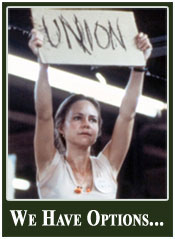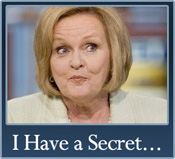The 2005 737 Settlement
An Empty Bag for Flight Attendants
$90 Million for AMR's Executives
In October of 2005, APFA forfeited a 737 Grievance that was estimated to be worth $9 million. Rather than demanding that the company cough up the cash, then-President Tommie Hutto-Blake and current Vice President Brett Durkin accepted crew meals on long-haul flight to Delhi and also 8 hours behind the door. The company, for its part, kept the cash and also eliminated manning positions Domestically on the MD80, 737 and 757, and also Internationally on the AFS-757, the AFS-767-300, the Hawaii-757, and Hawaii-767-300. Less than six months later, AMR doled out $90 million to the executives.
I inquired about this Settlement, specifically the value of it. While APFA refused to answer any questions, following is the answer that Mark Burdette gave me regarding the settlement. As you can see, the Settlement was another empty bag for the flight attendants.
++++++++++++++++++++++++++++++++++++++
-----Original Message-----
From: rock salomon [rocksalomon@hotmail.com]
Sent: Monday, November 07, 2005 11:51 AM
To: Mark Burdette
Subject: 737 Settlement
Dear Mark,
I've been reading about the 737 Settlement, but nowhere have I read the value of it. Can you tell me the value of the 737 Settlement?
Rock Salomon
301469
++++++++++++++++++++
Rock:
Sorry it has taken a couple of days for me to get back to you due to a heavy meeting schedule.
Thanks for your question about the value of the 737 settlement. I'm glad to hear that the 737 Settlement / Crew Layover Rest Agreement with APFA is getting attention on the line.
In many ways - to borrow from the Mastercard commercial - it's "priceless". It demonstrates that when we work together on issues of mutual concern, we can find solutions that are good for our flight attendants and good for the company.
This settlement agreement had many components. Because of the complexity, arriving at an acceptable solution took some time. It also means that there isn't a simple mathematical equation as the answer to your question.
Leadership of both the APFA and the company are pleased not only with the outcome of this settlement agreement, but with the process of working together that got us there.
Thanks for writing.
Mark Burdette
+++++++++++++++++++++++++
AmericanAirlines@
October 19, 2005
Mr. Brett Durkin
Vice President
Association of Professional Flight Attendants
1004 W. Euless Blvd.
Euless, TX 76040
RE: SETTLEMENT OF PRESIDENTIAL GRIEVANCE #2004-APFA-002 (737 STAFFING) AND AGREEMENT ON FLIGHT ATTENDANT LAYOVER REST AND CREW MEALS
Dear Brett:
This letter confirms the discussions between the parties regarding the full and final settlement of the above-referenced grievance; and the agreement between the parties with respect to Flight Attendant layover rest and crew meals.
In recognition of the improvements in Flight Attendant layover rest, Flight Attendant crew meals and enhancements in training procedures the APFA agrees to settle Presidential Grievance #2004-APFA-002.
The Company acknowledges that the APFA has gone to considerable expense in developing a Flight Attendant modeling program for the evaluation of future staffing requirements related to the type of in-flight service components utilized by the Company to more accurately evaluate staffing formulas. Both parties acknowledge the need for continued cost efficiencies in staffing without creating unreasonable workloads for Flight Attendants.
In addition, the parties recognize the high costs of arbitration and have agreed that in lieu of allocating additional financial resources for arbitration on staffing, the Company will explore joint participation in the use of APFA's modeling program developed by Damos Aviation to evaluate and project in-flight workload and tasks assessment of Flight Attendant duties.
The Union acknowledges that the Company has the right under the current collective bargaining agreement to change Flight Attendant staffing levels on board any aircraft so long as that change does not create an unreasonable workload for Flight Attendants. On October 18, 2005 the Company noticed the APFA pursuant to Article 9.B.2. and Appendix I, Article 9.B.2. of the collective bargaining agreement that it plans staffing reductions on specific aircraft based upon a reduction of in-flight service levels effective December 2,2005 (see attached Letter 1, dated 10/18/2005). The Company also noticed the APFA that additional reduction in staffing based on in-flight service levels would also occur effective January 1, 2006 (see attached Letter 2, dated 10/18/2005). The APFA and its certified data collectors under the direction of Dr. Damos had already conducted in-flight workload data collection and task analysis on several of these aircraft and conducted some initial workload analyses and has determined that the Company's reduction of in-flight service is one of the criteria to prevent the creation of unreasonable workload.
The following terms and conditions shall detail the application of the above agreements:
1. IMPROVED SCHEDULED AND REDUCED LAYOVER CREW REST
A. Domestic Layover Rest:
Improved scheduled and reduced layover crew rest will be effective the contractual month of December 2005. the company will not build Domestic sequences under the contractual provisions of Article 7.L.2. and Attachment F with less than nine (9) hours scheduled layover rest. In actual operations, layover rest for Domestic will not be reduced below eight hours twenty minutes (8:20). The parties agree this actual operation agreement is intended to require '8 hours behind the door' minimum rest and is comparable to the current pilot Domestic layover rest rules.
B. International non-IFSIAIFS Layover Rest:
Improved scheduled and reduced layover crew rest will be effective the contractual month of January 2006. The Company will not build non-IFS/AIFS International trip sequences under the contractual provisions of Appendix I, Article 7.L.2. with less than nine (9) hours scheduled layover rest. In actual operations, layover rest for non-IFS/AIFS flying will not be reduced below eight hours (8:00) plus travel time to and from the layover hotel. The parties agree this is intended to provide' 8 hours behind the door' .
C. International IFS (Europe/ Deep South America) and AIFS (Far East) Layover Rest:
Effective the contractual month of January 2006, the Company will not build International IFS and AIFS trip sequences under the contractual provisions of the agreement with less than ten hours thirty minutes (10:30) scheduled layover rest and will not reduce such layover rest in actual operations below ten (10) hours minimum.
D. Actual Operations:
If the above described minimum layover rest requirements cannot be met in the actual operation of a trip sequence, the crew upon reaching the layover rest city should contact the Company directly to reschedule the crew pick up to comport with the understandings of the terms and conditions outlined in l.A., B., or C. above.
2. LONG-RANGE AND EXTENDED-LONG-RANGE FLIGHT ATTENDANT CREW MEALS AND OTHER AGREED TO FOOD OPTIONS
A. International Crew Meals:
Effective the contractual month of December 2005 (November 15,2005 DEL) crew meals will be provided for each working Flight Attendant on long-range and extended long-range flights as defined by the collective bargaining agreement in Article 2.W.I. and 2. Crew meals on these flights will consist of the following:
Long-Range: Business Class Entree/First Class Bulk Salad Main Cabin Follow-On.
Extended Long-Range: Business Class Entree/First Class Bulk Salad with Main Cabin tray set-up. Main Cabin Entree with Main Cabin tray set-up.
B. Other Food Options:
On certain sequences where a long duty day and the inability of the crew to obtain food exist, the parties have agreed to meet quarterly and identify the most egregious sequences and to explore options for providing Flight Attendant food based on catering/vendor availability.
The parties agree to monitor this section of this Agreement on a quarterly basis.
3. IMPROVED EQUIPMENT AND SERVICE TRAINING POLICIES AND PROCEDURES
A. Voluntary Flight Attendant Option for Equipment or Service Training:
Pursuant to Article 9.F.9.a. and Appendix I, Article 9.F.9.a. of the collective bargaining agreement, the parties agree to allow Flight Attendants the option to obtain any service training (effective during December 2005) or equipment training (effective March 2006) offered on-line by the Company, regardless of base or seniority on a year-round basis and without the requirement of triggering training through bidding. This does not mandate the Flight Attendant to obtain the training in a classroom setting, nor does it expressly prohibit a Flight Attendant from obtaining training on equipment and/or service that is not being flown at the base or require the Company to trip remove Flight Attendants in order to attend such training.
With equipment training, a Flight Attendant may elect to complete the on-line portion of the training and then obtain the classroom/hands-on portion for equipment training on a day that EPT's is proffered to any base in the system, provided that the Flight Attendant is on a DO. A Flight Attendant will also have the option to complete the required hands-on portion of equipment training during the course of her/his annual EPT/RDT program provided this could be accomplished without adding an additional duty period to the Flight Attendant's schedule. Such training will be subject to the appropriate training pay as specified in Article 3.1I.2.
If, the classroom/hands-on portion of training cannot be accomplished at EPT/RDT's without the requirement of adding an additional duty period to the flight attendant's schedule, the existing trigger procedures of Article 9.F.9.a. and Appendix I, Article 9.F.9.a. remain in effect.
If service qualification training is offered entirely on-line and requires no classroom/hands-on portion, a Flight Attendant will be able to obtain training at anytime by completing the online portion on any DO. Training pay as specified in Article 3.1I.2. will apply.
Nothing in this Agreement is intended to alter the provisions of Training Pay as specified in Article 3.lI.2. Applicable training and/or stipend pay will continue to apply to all equipment and/or service training, including the three (3) hour minimum or hours above the minimum. All applicable on-line training hours shall be credited for all purposes as it is currently.
4. APFA/AA FLIGHT ATTENDANT WORKLOAD MODELING ANALYSIS
The Company and the APFA have agreed to jointly explore evaluation of Flight Attendant task and workload analysis on all aircraft using the modeling program and data collection methods developed for use by APFA in the 737 Presidential Grievance.
The parties reviewed the Workload Modeling Program on September 12, 2005 during a demonstration led by APFA's consultant. The intent of the parties is to explore the development of future joint modeling programs using scientific, objective analysis for all aircraft based upon baseline staffing formulas for each aircraft. This would require the parties to be jointly trained and certified by a scientific aviation expert in workload assessment, and to create the task lists for each Flight Attendant position, gather data, evaluate and assess Flight Attendant workload prior to any notice of intent to change staffing levels on any aircraft pursuant to Article 9.B.2 and Appendix I, Article 9.B.2. of the collective bargaining agreement.
It is understood that this joint effort does not change or inhibit the rights of either party contained in the agreement, including but not limited to APFA's filing of a Presidential Grievance if a dispute emanates from any future changes that might be made by the Company that are inconsistent with APFA's findings.
5. STAFFING CHANGES
A. Domestic Short Haul (less than 1:30) Liquor/Beverage New Staffing Formulas:
Effective December 2, 2005, the Company will change staffing levels on Domestic Short-Haul Liquor/Beverage flights (less than 1:30 flight time) in accordance with the provisions of Article 9.B.2. of the agreement as follows:
MD80 Bid 3
737 Bid 3
757 Bid 4The parties agree that the above staffing formulas are for in-flight service levels limited to liquor/beverage only, no accompaniments in main cabin of the above referenced aircraft. Should the Company increase the components for in-flight liquor/beverage service in any cabin of the aircraft listed above, the parties agree to meet and discuss the impact of such changes on Flight Attendant workload. If the parties fail to reach agreement on staffing impact of such changes APFA may invoke Paragraph 7 of this Agreement.
B. Hawaii/Two-Class Transcontinental New Staffing Formulas:
Additionally, effective January 1,2006, the Company will change staffing formulas on Hawaii markets flown with the 767-300 aircraft and two-class transcontinental markets. The changes resulted in reductions to the in-flight service levels on the affected flight legs, to wit: Buy On Board snack with fresh component. Most the changes adopted pursuant to Article 9.B.2. and Appendix I, Article 9.B.2. have been previously monitored by the APFA using APFA's Flight Attendant Workload Analysis Program. The Company does not anticipate any reduction of Flight Attendant jobs as a result of these staffing changes. The new staffing formula will be as follows:
AFS:
757 Bid 4, add F/A 5 at a total aircraft load of 110 passengers
767-300 767-300 Bid 6, add F/A 7 at a total aircraft load of 70 passengers
Hawaii: 757Bid 4, add F/A5 at a total aircraft load of 110 passengers Bid 7
767-300 Bid 7The parties agree that the above staffing formulas are for in-flight service levels limited to two-class service with the reduced in-flight meal/liquor/beverage service in the main cabin of the aircraft listed above in existence at the time this agreement is effective. Should the Company increase the components for in- flight meal/liquor/beverage in any cabin of the aircraft listed above, the parties agree to meet and discuss the impact of such changes on Flight Attendant workload. If the parties fail to reach agreement on staffing impact of such changes APFA may invoke Paragraph 7 of this Agreement.
6. JOINT COMMUNICATION OF THE TERMS OF THE AGREEMENT
The parties agree to create joint communications of the terms of this Agreement that will be developed by/through APFA Vice President, Brett Durkin and Managing Director Flight Service, Cathy Scheu. All announcements and communications of this Agreement will subsequently be disseminated to Flight Attendants through APFA President, Tommie Hutto-Blake and Vice President Onboard Service, Lauri Curtis under a mutually agreed time frame.
7. EXPEDITED ARBITRA TION AGREEMENT
It is understood by the parties that any breach or dispute(s) that might arise out of the application of the terms of this Agreement should be submitted to an expedited arbitration process, if the parties themselves are unable to resolve the dispute within 30 days following written notice by either party of a breach or dispute. The parties agree that an Ad hoc Arbitrator will be selected from the National Academy of Arbitrators and the case will be scheduled to be heard within 60 days of the submission of a grievance into the System Board of Adjustment and the decision shall be rendered by the Arbitrator in writing no later than 45 days following the conclusion of the expedited arbitration hearing. All other relevant procedures contained in of the collective bargaining agreement will be applicable.
8. RESERVATION OF RIGHTS
The parties herein agree that the resolutions contained within this Agreement affect only the issues outlined within this settlement letter and do not alter or will not prejudice either parties' rights or limit or expand obligations concerning other provisions of the collective bargaining agreement.
9. WITHDRAWAL OF GRIEVANCE
In consideration of the above agreements, the APFA agrees to withdraw, without prejudice, Presidential Grievance 2004-APFA-002, regarding 737 staffing changes.
The Company and the Union recognize that this Settlement and Agreement were reached through the good faith efforts of both parties to address the issues of mutual concern while preserving the continued need for cost efficiency of the Company's operations.
Sincerely,
Mark Burdette
Vice President
Employee Relations
American Airlines, Inc.
Agreed to:
Tommie Hutto-Blake - Dated: 10/20/05
APFA President and
Article 28.B.2. Representative
Agreed to:
Brett Durkin - Dated: 10/19/05
APFA Vice President
Agreed to:
Lauri Curtis - Dated: 10/19/05
Vice President
Onboard Services
Agreed to:
Cathy Scheu - Dated: 10/19/05
Managing Director
Flight Service











